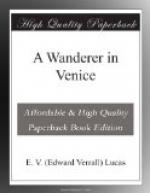In the afternoon of the 1914 ceremony the Principe Tommaso left the Arsenal in a motor-boat for some distant vessel. I chanced to be proceeding at the time at a leisurely pace from S. Niccolo di Lido to S. Pietro in Castello. Suddenly into the quietude of the lagoon broke the thunder of an advancing motor-boat proceeding at the maximum speed attainable by those terrific vessels. It passed us like a sea monster, and we had, as we clung to the sides of the rocking gondola, a momentary glimpse of the Principe behind an immense cigar. And then a more disturbing noise still, for out of the Arsenal, scattering foam, came four hydroplanes to act as a convoy and guard of honour, all soaring from their spray just before our eyes, and like enraged giant dragon-flies wheeling and swooping above the prince until we lost sight and sound of them. But long before we were at S. Pietro’s they were furiously back again.
Beyond the gardens, and connected with them by a bridge, is the island of S. Elena, where the foundry was built in which were recast the campanile bells after the fall of 1902. This is a waste space of grass and a few trees, and here the children play, and here, recently, a football ground—or campo di giuoco—has been laid out, with a galvanized iron and pitch-pine shed called splendidly the Tribuna. One afternoon I watched a match there between those ancient enemies Venice and Genoa: ancient, that is, on the sea, as Chioggia can tell. Owing to the heat the match was not to begin until half-past four; but even then the sun blazed. No sooner was I on the ground than I found that some of the Genoese team were old friends, for in the morning I had seen them in the water and on the sand at the Lido, and wondered who so solid a band of brothers could be. Then they played a thousand pranks on each other, the prime butt being the dark young Hercules with a little gold charm on his mighty chest, which he wore then and was wearing now, who guarded the Genoese goal and whose name was Frederici.
It was soon apparent that Venice was outplayed in every department, but they tried gallantly. The Genoese, I imagine, had adopted the game much earlier; but an even more cogent reason for their superiority was apparent when I read through the names of both teams, for whereas the Venetians were strictly Italian, I found in the Genoese eleven a Macpherson, a Walsingham, and a Grant, who was captain. Whether football is destined to take a firm hold of the Venetians, I cannot say; but the players on that lovely afternoon enjoyed it, and the spectators enjoyed it, and if we were bored we could pick blue salvia.
This island of S. Elena has more interest to the English than meets the eye. It is not merely that it is green and grassy, but the daughter of one of our national heroes is thought to have been buried there: the Empress Helena, daughter of Old King Cole, who fortified Colchester, where she was born. To be born in Colchester and be buried on an island near Venice is not too common an experience; to discover the true cross and be canonized for it is rarer still. But this remarkable woman did even more, for she became the mother of Constantine the Great, who founded the city which old Dandolo so successfully looted for Venice and which ever stood before early Venice as an exemplar.




